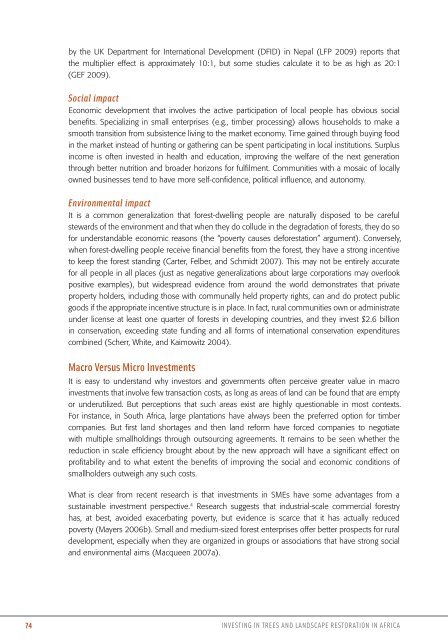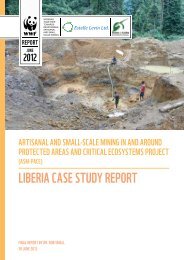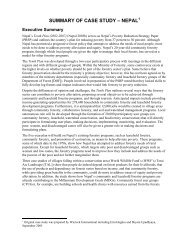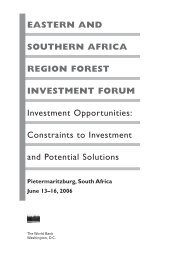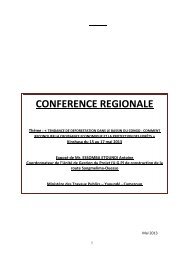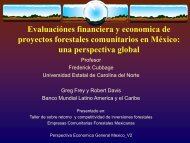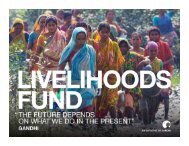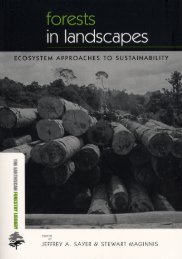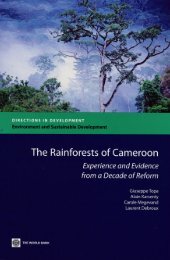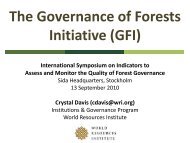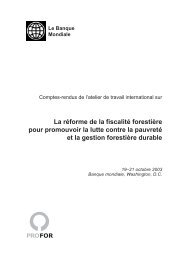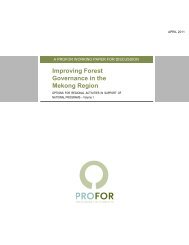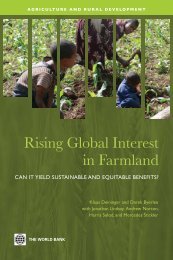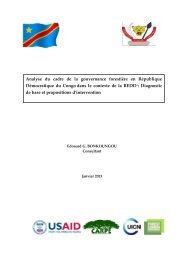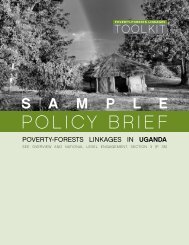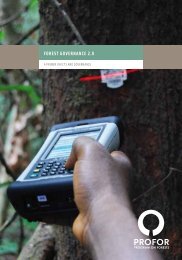INVESTING IN TREES AND LANDSCAPE ... - PROFOR
INVESTING IN TREES AND LANDSCAPE ... - PROFOR
INVESTING IN TREES AND LANDSCAPE ... - PROFOR
You also want an ePaper? Increase the reach of your titles
YUMPU automatically turns print PDFs into web optimized ePapers that Google loves.
y the UK Department for International Development (DFID) in Nepal (LFP 2009) reports that<br />
the multiplier effect is approximately 10:1, but some studies calculate it to be as high as 20:1<br />
(GEF 2009).<br />
Social impact<br />
Economic development that involves the active participation of local people has obvious social<br />
benefits. Specializing in small enterprises (e.g., timber processing) allows households to make a<br />
smooth transition from subsistence living to the market economy. Time gained through buying food<br />
in the market instead of hunting or gathering can be spent participating in local institutions. Surplus<br />
income is often invested in health and education, improving the welfare of the next generation<br />
through better nutrition and broader horizons for fulfilment. Communities with a mosaic of locally<br />
owned businesses tend to have more self-confidence, political influence, and autonomy.<br />
Environmental impact<br />
It is a common generalization that forest-dwelling people are naturally disposed to be careful<br />
stewards of the environment and that when they do collude in the degradation of forests, they do so<br />
for understandable economic reasons (the “poverty causes deforestation” argument). Conversely,<br />
when forest-dwelling people receive financial benefits from the forest, they have a strong incentive<br />
to keep the forest standing (Carter, Felber, and Schmidt 2007). This may not be entirely accurate<br />
for all people in all places (just as negative generalizations about large corporations may overlook<br />
positive examples), but widespread evidence from around the world demonstrates that private<br />
property holders, including those with communally held property rights, can and do protect public<br />
goods if the appropriate incentive structure is in place. In fact, rural communities own or administrate<br />
under license at least one quarter of forests in developing countries, and they invest $2.6 billion<br />
in conservation, exceeding state funding and all forms of international conservation expenditures<br />
combined (Scherr, White, and Kaimowitz 2004).<br />
Macro Versus Micro Investments<br />
It is easy to understand why investors and governments often perceive greater value in macro<br />
investments that involve few transaction costs, as long as areas of land can be found that are empty<br />
or underutilized. But perceptions that such areas exist are highly questionable in most contexts.<br />
For instance, in South Africa, large plantations have always been the preferred option for timber<br />
companies. But first land shortages and then land reform have forced companies to negotiate<br />
with multiple smallholdings through outsourcing agreements. It remains to be seen whether the<br />
reduction in scale efficiency brought about by the new approach will have a significant effect on<br />
profitability and to what extent the benefits of improving the social and economic conditions of<br />
smallholders outweigh any such costs.<br />
What is clear from recent research is that investments in SMEs have some advantages from a<br />
sustainable investment perspective. 4 Research suggests that industrial-scale commercial forestry<br />
has, at best, avoided exacerbating poverty, but evidence is scarce that it has actually reduced<br />
poverty (Mayers 2006b). Small and medium-sized forest enterprises offer better prospects for rural<br />
development, especially when they are organized in groups or associations that have strong social<br />
and environmental aims (Macqueen 2007a).<br />
74 <strong><strong>IN</strong>VEST<strong>IN</strong>G</strong> <strong>IN</strong> <strong>TREES</strong> <strong>AND</strong> L<strong>AND</strong>SCAPE RESTORATION <strong>IN</strong> AFRICA


